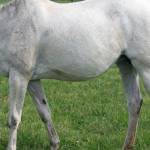Exploring IVF for Improved Equine Fertility

Various reproductive options exist for mares that have trouble achieving or maintaining pregnancy. One such option involves injecting eggs or ova collected from mares with semen and then transferring those fertilized eggs into either the original donor mare or a suitable recipient mare.
“The procedure is complex, making it an expensive assisted reproductive technique. The ova must be successfully fertilized with the semen of choice and then frozen or cryopreserved. These fertilized ova must then be thawed and implanted into a mare at the appropriate time. While frozen, the ova may be transported anywhere in the world, assuming storage conditions remain optimal,” explained Laura Petroski-Rose, B.V.M.S., a Kentucky Equine Research veterinarian.
She added, “Not surprisingly, there is a lot of room for error along the way, and despite being expensive and necessitating a great deal of planning, the success rate may not meet many breeders’ expectations.”
For example, one group of reproductive researchers recently reported* that of 261 blastocysts (eggs fertilized by intracytoplasmic injection of semen), only about 50% of recipient mares were pregnant 7-10, 23, and 37 days after embryo transfer. Factors such as mare’s age, reproductive history, and mare management did not appear to affect those pregnancy rates.
“Nonetheless, the researchers did suggest transferring those cryopreserved embryos into recipient mares 4-5 days after ovulation, and that slow embryonic growth after transfer could predict pregnancy loss,” shared Petroski-Rose.
According to the researchers, being aware of factors affecting pregnancy outcomes “can be of great value to equine practitioners when making a treatment plan and managing client expectations.”
Discuss the various assisted reproductive techniques currently available and choose the best one for your operation. Regardless of which procedure you ultimately select, help ensure success by properly prepping your recipient mare for pregnancy.
“This involves ensuring her plane of nutrition is appropriate, her routine veterinary preventive care such as vaccinations and farriery are up to date, and supplementing with a fish oil containing adequate levels of the omega-3 fatty acids DHA and EPA to support gestation,” Petroski-Rose advised.
Kentucky Equine Research offers EO-3, a potent marine-derived source of omega-3 fatty acids that are proven to support equine reproduction both before and after parturition.
*Claes, A., J. Cuervo-Arango, J. van den Broek, et al. Factors affecting the likelihood of pregnancy and embryonic loss after transfer of cryopreserved in vitro produced equine embryos. Equine Veterinary Journal. In press.








